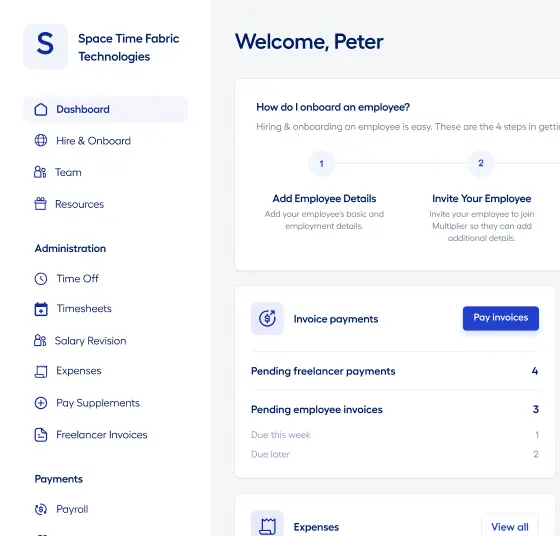Most entrepreneurs prefer starting their business journey as sole proprietors. That’s not at all surprising, considering the ease of setup in a sole proprietorship business.
But as a business grows, a sole proprietorship might seem to limit opportunities. That’s when an owner decides to make the transition, that is, change sole proprietorship to LLC.
Switching from a sole proprietorship to LLC might seem like a daunting task first. But as one starts operating, one realizes the many benefits of an LLC over a sole proprietorship.
This blog is all about converting from a sole proprietorship to LLC. So, if you have questions like can I change my sole proprietorship to an LLC or how to convert a sole proprietorship to LLC, you’ll find your answers here.
The Basic Differences between Sole Proprietorship and LLC
Before making your sole proprietorship change to LLC, you must know the differences between the two business structures.
Here, we have listed the fundamental differences between sole proprietorship and LLC to ensure ease of operations.
- In an LLC, the business is a separate legal entity run by its owner(s). It is mandatory to register an LLC. On the other hand, a sole proprietorship is not separate from its owners. Hence, registering a sole proprietorship business is not mandatory.
- In an LLC, the owner(s) have liability limited to their extent of investments. Whereas in a sole proprietorship, owners have unlimited liabilities.
- A single individual, the owner fully manages a sole proprietorship business. But in LLCs, one might choose to run the business with a few others or appoint managers.
- In an LLC, taxes apply to members at a relevant rate. The owner’s taxes and the business taxes are the same for sole proprietors. The business has no separate tax filing.
Why Change a Sole Proprietorship to an LLC?
When you decide to convert a sole proprietorship to LLC, you must back up your decision with valid reasons.
The first reason behind changing from a sole proprietorship to LLC is the benefit of limited liability. The owner’s assets are separate from the business assets in the LLC business structure. Thus, you can protect your personal property and other assets and ensure that your business debts remain limited to the LLC. In other words, you are not personally liable for the business debts.
Because of this limited liability concept, many entrepreneurs prefer the conversion of a sole proprietorship to an LLC. For instance, if you want to protect your personal property from being subject to your business-related lawsuit, LLC is a good option for you. Similarly, if you do not want your card or bank account to be at risk in business lawsuits, go for LLC.
However, there might be certain limitations to transferring a sole proprietorship to LLC. In some states, not every sole proprietor can change to an LLC.
Certain licensed professionals like attorneys are not permitted to form an LLC. Instead, they must arrange their businesses with different types of legal entities. In a few other states, professionals can form LLCs, but they might not protect their personal property from malpractice claims.
3 Major Benefits of Changing Sole Proprietorship to an LLC
Can you change a sole proprietorship to an LLC?
Yes.
But, what’s wrong with running a sole proprietorship?
Nothing.
There’s nothing possibly wrong with operating as a sole proprietor. But depending on the situation, a sole proprietorship might not be the ideal business structure for you. In such cases, conversion of sole proprietorship into LLC would be potentially beneficial.
Here are a few potential benefits you can enjoy by changing sole proprietorship to LLC. Read on to know!
1. Legal separation of business and the Owner
There is no legal separation between the business and its owner in a sole proprietorship. Therefore, if a third party sues your business or runs into debts, the owner is personally liable. That is, the owner is responsible for the debts and legal claims. Hence, the owner’s home, personal vehicle, property, and other assets are all at risk.
You can protect your assets when you change from a sole proprietorship to LLC. In LLC, the business is a separate legal entity from its owners. Hence, under most situations, the owner of the LLC is not personally responsible for the business debts and lawsuits.
2. Tax flexibility
Unlike a sole proprietorship, LLC provides you with tax flexibility. By default, the taxation method is the same as that of a sole proprietorship. The business profits and losses flow through the owner’s personal income tax returns. But for LLCs that comply with the IRS’s eligibility criteria might be taxed as an S Corporation. This helps the business owners get rid of certain self-employment tax burdens.
Note: An S Corporation is a corporation elected to pass corporate income, deductions, credits, and losses through to their shareholders for taxation.
3. Raising funds
In sole proprietorships, raising funds is a challenge. But when you change sole proprietorship to LLC, external funding becomes easier. Why so?
In making investments, investors do not generally prefer sole proprietorship businesses. They fund established companies as legal entities. So, if you are willing to seek funds from external sources, LLC is the perfect business structure for you.
Besides these potential benefits of switching from a sole proprietorship to an LLC, there is an added benefit too. LLC, a separate legal entity, makes your business more credible to customers and vendors. That is, with an established and formal business entity, you might attract more suppliers and customers to your business.
How to Change a Sole Proprietorship to LLC?
Once you decide to change a sole proprietorship to LLC, the first question that comes to mind is –
How to change your sole proprietorship to an LLC?
Well, in this section of the blog, we’ll tell you the detailed steps of how to go from a sole proprietorship to an LLC. So, let’s get started!
1. Seek professional assistance
When you are full of questions like;
- Can I change sole proprietorship to LLC?
- How do I change my sole proprietorship to an LLC?
Then, professional assistance is a must for you.
Several parts of an LLC need consideration. And to understand those, you might need some assistance.
You can go for online legal services or hire an attorney to change a sole proprietorship to an LLC. Their services will guide you through the setup process. However, for a start, we recommend taking online services as they are inexpensive. You can even hire an attorney. In that case, you will receive expert assistance at a much higher cost.
2. Pick the perfect name
Before you start converting the sole proprietorship to LLC, choose a name for the LLC.
Though the LLC name requirements differ by state, it is mandatory in all states to choose a name that reflects the status of the LLC. Also, choose a name that includes the term ‘Limited Liability Company’ or the abbreviated form of it, that is, ‘LLC’.
3. Appoint a registered agent
A registered agent serves as the main point of contact for communication with the state and other legal authoritative bodies. So, here you have three options to choose from;
- Designate a registered agent
- Appoint your attorney as the registered agent or
- Play the role of a registered agent by yourself.
Depending on your situation, knowledge, and resources, you can decide.
4. Prepare and file the articles of the organization
The article of an organization is an essential document for an LLC. It contains essential information like the name and address of the business, names of members, registered agents, etc.
5. Register with the IRS
The next step to change a sole proprietorship to an LLC involves registering with the Internal Revenue Service or IRS.
For taxation, the IRS classifies an LLC as a corporation, partnership, or a disregarded entity (where the owner’s tax returns include the business income).
So, you can either stick to the default IRS classification or choose a different option for your LLC using Form 8832.
6. Get new licenses for your LLC
When you convert a sole proprietorship to an LLC, you need to re-apply for the new business structure licenses. The regulations for licenses differ by industry, state, and even locality. So, determine what licenses you need and then apply for them accordingly with relevant state authorities.
7. Get in touch with your insurance service provider
Notify your insurance service provider about the change in your business structure. They can help you determine what insurances will be necessary for your LLC. Also, they can advise you on purchasing a new business insurance policy.
8. Update your banking information
In most cases, when you change a sole proprietorship to an LLC, you need to open a new bank account for the LLC. However, you will need to update the banking information related to your business at the very least. This is to ensure that the information reflects your LLC status.
If you open a new business account, make sure you close the old one. But before closing, go through the necessary information like all checks and business purchases.
While you might have to wait for the payments, stop using the previous account. Make the changes in the banking information for your automatic payments. Also, inform your clients about the new LLC status and the LLC name so that they can issue your payments.
9. Get your LLC operating agreement ready
After you complete all of the above steps, make sure to create the LLC operating agreement. This legal document outlines the ownership information and member duties.
10. Transfer existing EIN or get a new one
Employer Identification Number or EIN is a number that IRS uses to identify and tax businesses. According to the IRS, you must get a new EIN when you change a sole proprietorship to an LLC. Apply directly with the IRS and get your EIN for free.
Solve the Challenges of Sole Proprietorship with Multiplier
Finding it hard to change sole proprietorship to LLC? Start outsourcing the right talent who can help in this transition. Onboarding international employees, freelancers, and independent contractors are no longer a challenge when Multiplier is by your side.
Multiplier is a SaaS-based onboarding tool that helps businesses with:
- Prompt employee onboarding
- International payroll management
- Generating compliant contracts
For more information, Start your free demo now!
FAQ
Q. Why is an LLC better than a sole proprietorship?
LLC protects you from personal liability by separating your identity from a sole proprietorship. You can get investment easily from investors as well as LLCs.
Q. When should I turn my sole proprietorship into an LLC?
There is no right or wrong time. When you want to expand your business and are ready to give it a more structural form, you can convert it to LLC.
Q. What are the disadvantages of changing from a sole proprietorship to an LLC?
As LLC, you cannot make decisions solely. You have to consult your stakeholders before making any decisions regarding your company.







